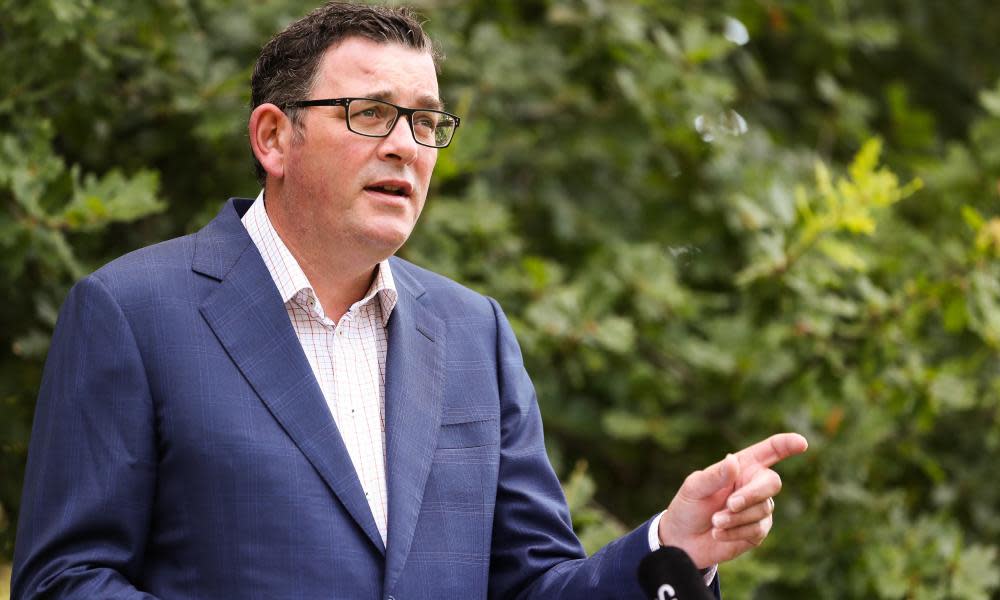Daniel Andrews warns of rising antisemitism after neo-Nazi gathering in Victorian national park

Daniel Andrews has warned that “evil” and “wicked” antisemitism is on the rise after a meeting of neo-Nazis in Victoria’s Grampians national park on Saturday.
The Age and the Sydney Morning Herald reported that dozens of far-right extremists gathered in the Grampians and Halls Gap over the Australia Day weekend, chanting white supremacist slogans, raising their arms in Nazi salutes and some wearing army fatigues.
The group’s activities prompted complaints to local police, who told local ABC news that they attended but could not identify any crime.
The group is now reportedly being monitored by Victoria police and the domestic spy agency, Asio.
The Victorian premier told a press conference on Thursday there was “no place for that sort of bigotry and hatred” in his state.
“I would make the point as well, that many would argue, and the international evidence is very clear, and indeed the local evidence, that antisemitism is on the rise,” Andrews said.
Related: Antisemitism and Holocaust denial on the rise in Australia, Josh Frydenberg warns
“And it’s an evil thing, it’s a wicked thing. I’ll just take this opportunity to send a message to the Jewish community across Victoria. You have and you continue to make a profound contribution to our state.”
In a statement, Victoria police said it was “equipped and well-prepared” to deploy resources and to respond and intervene where needed.
“Victoria police will not comment specifically on the ongoing activities of far-right groups, except to say that we closely monitor a range of groups to ensure there is no threat to public safety,” a spokeswoman said.
“Responding to these groups and associated events and protests is part of what police do on a daily basis.”
The group is believed to be from the National Socialist Network, a white supremacist neo-Nazi group with members in most major cities in Australia.
The Guardian has seen images posted by the NSN of a burning cross, which appeared to be from the trip to the Grampians.
Experts say such events are not new and are designed to attract media attention in a bid to bring in new members and spread messages of hate.
Dr Andre Oboler, the chief executive of the Online Hate Prevention Institute, said a similar Grampians tour was attempted by one of the group’s precursors.
“This was really just a repeat. The group that was there was really just a merger of two existing groups, and one of those groups, Antipodean Resistance, actually did a similar tour through the Grampians a couple of years ago and received quite a lot of media attention for it,” Oboler told the ABC.
“So really this was them trying to achieve the same thing again.”
Such events pose difficult questions for the media as it seeks to expose the threat of far-right extremism without amplifying its messages or aims.
Victoria police declined to say whether they were considering charges against any of the group. The spokeswoman said the force had “undertaken a number of investigations covering extremism from a range of backgrounds irrespective of religious, political or ideological motivation”.
Related: How Australia's anti-terror regime has failed to rein in far-right extremists
“Victoria police is committed to responding to any acts of racism, discrimination or vilification based on religion, culture or ethnicity,” she said. “We encourage anyone who has been a victim of a prejudice related crime to reach out to police for assistance. Every Victorian has the right to feel safe and secure in the community and in pursuing their values, beliefs and interests.”
Intelligence agencies have increasingly voiced their alarm about far-right extremism in Australia, including in September, when the Australian Security Intelligence Organisation appeared before a parliamentary inquiry. Asio deputy director general of intelligence service delivery, Heather Cook, said violent far-right extremism constituted up to 40% of the domestic spy agency’s counter-terrorism caseload, up from 10-15% before 2016.
Despite this, laws allowing terrorist organisations to be proscribed have never been used for far-right groups.
The Labor MP Anne Aly has previously told the Guardian the failure to proscribe such groups had allowed them to flourish.
“We have a history in this country of not dealing with rightwing-motivated violence in a serious manner,” she said.
“We haven’t dealt with this threat in the past in the way we would have if they were, quite frankly, Islamic-based ideological groups. It has had the side effect of allowing rightwing extremist groups to continue to grow, organise and flourish.”

 Yahoo Movies
Yahoo Movies 
